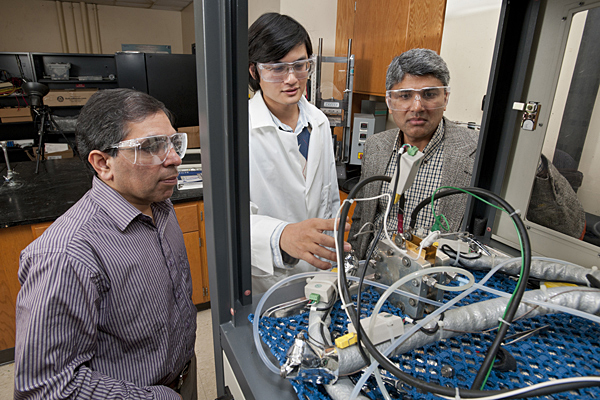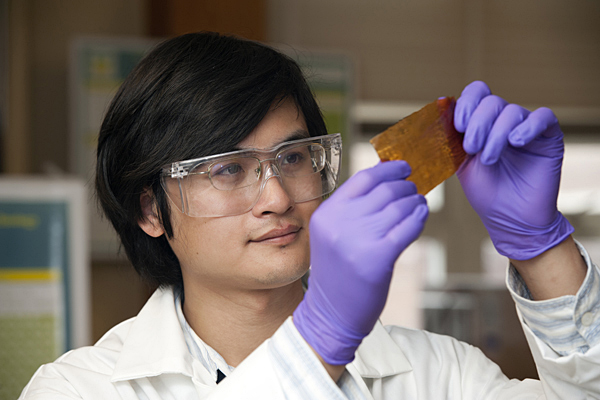Fueling innovation
UD post-doctoral researcher makes strides in fuel cell technology
8:48 a.m., Nov. 30, 2011--Liang Wang, a post-doctoral researcher in the University of Delaware's Center for Fuel Cell Research in the Department of Mechanical Engineering, is developing new materials and structures that can improve the quality of fuel cell technology by increasing the durability of the fuel cell membrane.
Like batteries, fuel cells are electrochemical energy conversion devices that produce electricity. By converting hydrogen and oxygen into water, they can be a valuable power source for vehicles, buildings and devices like laptops and cell phones.
Research Stories
Chronic wounds
Prof. Heck's legacy
Wang’s research is aimed at developing new materials and structures for proton exchange membrane (PEM) fuel cells, which are considered the best type of fuel cell for vehicles, and are predicted to eventually replace gasoline and diesel internal combustion engines.
PEM fuel cells use a solid polymer membrane, or thin plastic film, that is permeable to protons when saturated with water. However, water present in the fuel cell could repeatedly freeze and melt while operating in cold climates, forcing the cell to expand and contract, and causing stress and deterioration of the membrane.
Wang’s research focuses on improving fuel cell membrane durability through the development of robust materials that can withstand stress due to temperature change, which is a major challenge for the commercial deployment of automotive fuel cells.
He works with graduate and undergraduate students in the Fuel Cell Research Laboratory to create novel materials and structures for PEM fuel cells targeted at improving durability, reducing cost and increasing fuel cell performance.
They have successfully developed membranes with improved durability based on polymer and carbon nanotube composite materials that exhibit high stress tolerance during freeze-thaw cycling.
Wang is advised by Suresh G. Advani, George W. Laird Professor of Mechanical Engineering and associate director of the Center for Composite Materials, and Ajay K. Prasad, professor of mechanical engineering and director of the Center for Fuel Cell Research.
His work, which is part of the Fuel Cell Bus Program and which is supported by the Federal Transit Administration, was recently recognized at the 2011 International Fuel Cell Seminar and Exposition. Wang’s poster entitled “Freeze-Thaw Durability Study of MWCNTs Nafion Reinforced Membranes,” earned first place out of over 120 poster submissions.
“Dr. Wang is full of clever ideas and pursues them with vigor,” said Prasad. “He has been with the University of Delaware for just about one year, yet has already initiated several innovative projects that seek to improve fuel cell technology.”
Article by Gabriella Chiera
Photos by Evan Krape












